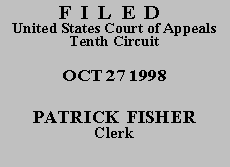

| DENNIS ESTELL,
Petitioner-Appellant, v. ATTORNEY GENERAL OF THE STATE OF OKLAHOMA, Respondent-Appellee. |
|
Dennis Estell appeals from the district court's order denying his habeas corpus petition, filed pursuant to 28 U.S.C. § 2254. Appellant was convicted of burglary in the second degree after former conviction of two or more felonies, for which he was sentenced to a fifty-year term in prison. Our jurisdiction over his appeal arises under 28 U.S.C. §§ 1291 and 2253. Because appellant's habeas petition was filed after the enactment of the Antiterrorism and Effective Death Penalty Act of 1996, the certificate of appealability provision created by that act is applicable to his case. See 28 U.S.C. § 2253(c)(1)(A). The district court denied appellant a certificate of appealability. Therefore, appellant must demonstrate "a substantial showing of the denial of a constitutional right" before this court considers his appeal. See id. § 2253(c)(2). Respondent has not filed a brief in this appeal.
Appellant presents several arguments in support of his motion for a certificate of appealability. He contends that the district court erred because it failed to make a de novo review of the record following appellant's objections to the magistrate judge's report, failed to liberally construe appellant's habeas petition to include a due process claim in connection with challenges to his sentence enhancement on the basis of prior convictions, and failed to hold a hearing on his petition. He argues constitutional error in his sentencing based on 1) his allegations that the prior convictions were not all his, 2) his assertion that the sentencing court inadequately instructed the jury on the government's burden to prove the prior convictions beyond a reasonable doubt, and 3) the sentencing court's reliance on a joint stipulation, to which appellant allegedly did not agree, regarding evidence of the prior convictions. Finally, he contends trial counsel was ineffective for stipulating to evidence about the prior convictions.
After careful review of the record on appeal, together with appellant's arguments, and in light of the applicable law, we conclude that appellant has not demonstrated his eligibility for a certificate of appealability. Therefore, for substantially the same reasons contained in the magistrate judge's report, dated November 17, 1997, a copy of which is appended to this order and judgment, appellant's motion for a certificate of appealability is DENIED, and this appeal is DISMISSED.
Entered for the Court
Circuit Judge
Attachment not available electronically.
*. This order and judgment is not binding precedent, except under the doctrines of law of the case, res judicata, and collateral estoppel. The court generally disfavors the citation of orders and judgments; nevertheless, an order and judgment may be cited under the terms and conditions of 10th Cir. R. 36.3.